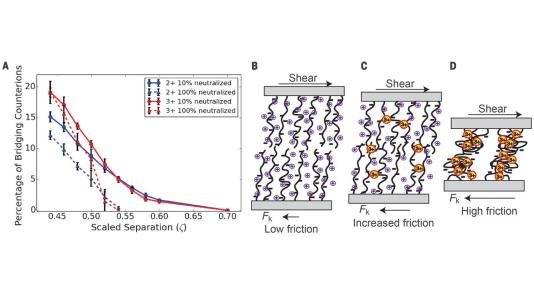
Scientific Achievement
Molecular mechanism for and demonstration that multivalent ions diminish the lubricity of polyelectrolyte brushes.
Significance and Impact
Polyelectrolyte brushes arise in varied biological and industrial contexts, including the surfaces of articular cartilage, interfaces between mineralized collagen, anti-fouling surfaces, and medical prostheses. The impact of trace concentrations of multivalent ions on brush structure is critical to designing their robust function in diverse environments.
Research Details
- Surface Forces Apparatus measurements of the friction of opposing polyelectrolyte brushes in the presence of monovalent, divalent, and trivalent ions.
- Brushes in monovalent salt show high lubricity, whereas those in multivalent ions show dramatically decreased lubricity.
- Molecular dynamics simulations identify two molecular mechanisms for decreased lubricity: (I) multivalent ion chain-bridging events and (II) heterogeneous brush collapse leading to increased surface roughness.
Argonne National Laboratory seeks solutions to pressing national problems in science and technology. The nation’s first national laboratory, Argonne conducts leading-edge basic and applied scientific research in virtually every scientific discipline. Argonne researchers work closely with researchers from hundreds of companies, universities, and federal, state and municipal agencies to help them solve their specific problems, advance America’s scientific leadership and prepare the nation for a better future. With employees from more than 60 nations, Argonne is managed by UChicago Argonne, LLC for the U.S. Department of Energy’s Office of Science.
The U.S. Department of Energy’s Office of Science is the single largest supporter of basic research in the physical sciences in the United States and is working to address some of the most pressing challenges of our time. For more information, visit https://energy.gov/science.